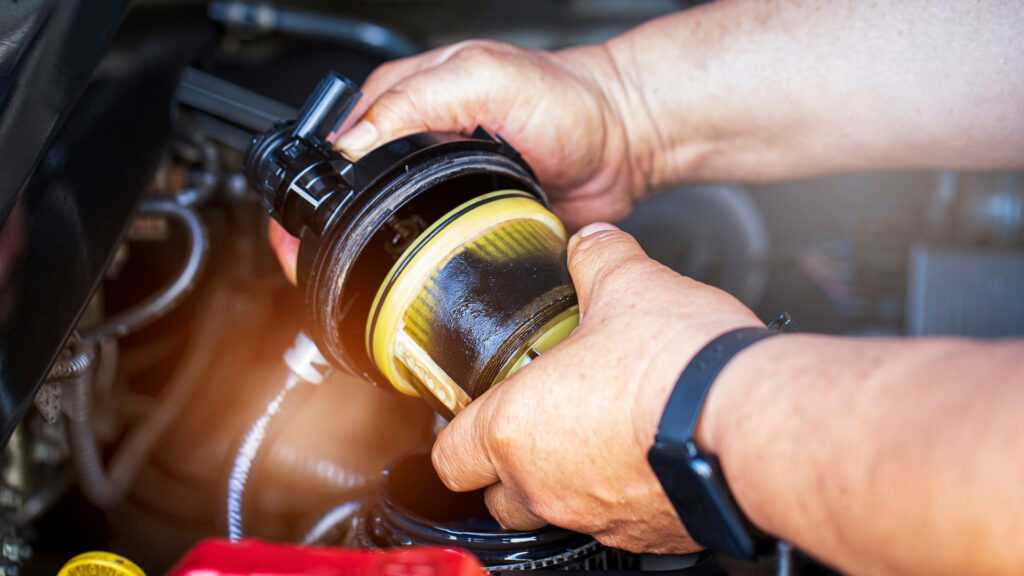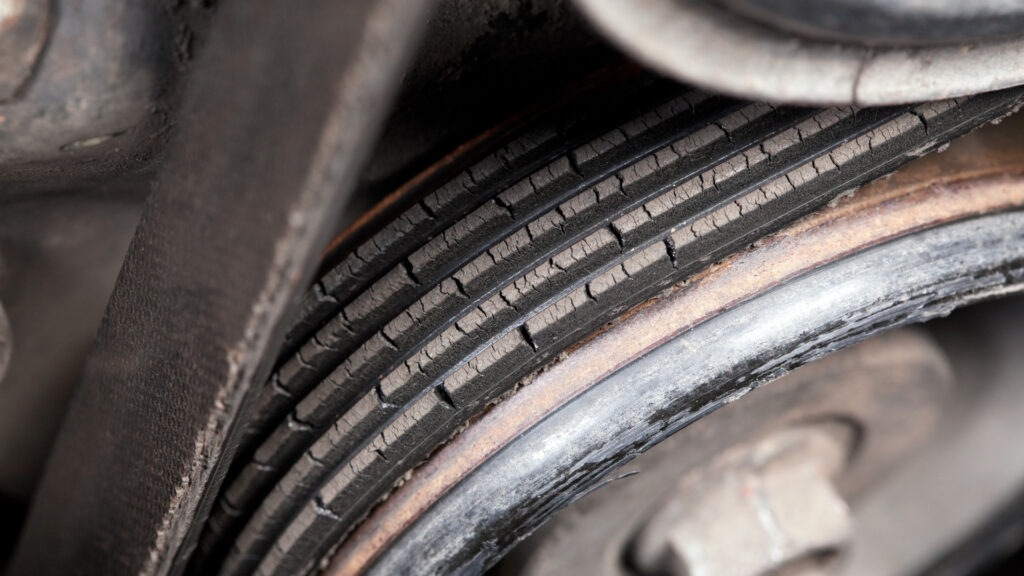Table of Contents Show
Just like you regularly change the oil in your vehicle, you must change the oil in your RV. Basic maintenance can go a long way in preventing disasters and expensive repairs.
You’ve already spent a lot of money on your RV. Don’t try to save money by cutting corners on maintenance tasks. Do your diligence to properly care for the engine, like getting regular RV oil changes.
Let’s take a closer look at how often you should do this!
What Causes Engine Oil To Get Dirty?
If you own a motorhome, you must take care of the fluids like in a standard vehicle. Engine oil gets dirty in your Class A Fleetwood just like it does in your Toyota Tacoma.
Fresh motor oil is usually a transparent amber or light brown, but eventually, the oil turns deep black or brown. Because of the high heat of the engine, the oil gets dirty over time.
In addition, tiny metal parts from the engine can mix in with the oil. Dirt and dust also add to the darkening of the oil color. This is why keeping up with regular RV oil changes is important.
When Do I Need an RV Oil Change?
An RV oil change should happen about as often as a standard car oil change. Usually, this is every 4,000 to 6,000 miles or so. However, this mileage isn’t an exact science.
The driving environment, extreme temperatures, engine age and condition, and other factors also contribute to the frequency of an RV oil change.
If your engine has to work harder due to mountainous roads or towing a vehicle, you’ll need more frequent RV oil changes.
On the other hand, vehicles with synthetic oil can go up to 15,000 miles or so. Plus, diesel engines require fewer oil changes at about 20,000 miles.
If your motorhome is under warranty, always follow what the owner’s manual says about the frequency of oil changes. Failing to do so may void the warranty. Even though you may spend more money on RV oil changes, it’s best, in the long run, to keep your engine healthy.

Can I Complete an RV Oil Change Myself?
You can complete an RV oil change yourself. If you’re in a campground, though, ask if the campground allows this. Often you can’t do vehicle maintenance in these places.
Also, consider the time and effort in changing the oil yourself. Sometimes taking your motorhome to a shop or calling a mobile mechanic is easier.
But an RV oil change is pretty simple if you have the right tools. You’ll need a drain pan, oil filter wrench, funnel, and wrench or socket for the oil pan drain plug.
You’ll also need a place to dispose of the oil. Keep in mind the amount of oil in your RV. Some motorhomes can have 29 to 30 quarts. That’s a whole lot for a tiny drain pan.
You might not be able to contain it all on your own. If you can’t properly contain or dispose of the oil, it’s best to take your motorhome to a shop or call a mobile mechanic.
Where Can I Take My RV for an Oil Change?
This will vary from RV owner to RV owner. Some shops can change the oil in a gas rig but not a diesel pusher. You’ll need to call around.
But you don’t have to use an RV dealership. It’s possible a local mechanic can complete the oil change. Just make sure the technician is familiar with RVs in general. You also might want a mechanic who is familiar with your particular model.
Calling a mobile mechanic is also a possibility. This saves you the travel time of going into a brick-and-mortar shop. The cost may be the same or even more expensive, but having a technician come to you can save you time.
How Much Does an RV Oil Change Cost?
Rates between shops and mobile mechanics will vary. Larger engines will require more oil and bigger filters, so they’ll cost more than smaller engines. The engine, oil choice, and fuel type will all affect the overall cost of an RV oil change.
Completing the maintenance yourself will be much cheaper since you’ll only spend money on the supplies rather than the labor. This will usually cost less than $100. Large dealerships and national chains will be the most expensive options since they’re also the most comprehensive.
Expect to pay up to twice as much for diesel engines as you would for gas engines. This is one reason some RV owners choose to go with a gas motorhome instead.
However, diesel pushers offer more power, better fuel economy, and increased longevity. These benefits outweigh the upfront cost and maintenance for other RVers.
In general, an oil change will cost anywhere between $80 to $150. A Class B camper van will be at the lower end, while a Class A diesel pusher will sit at the higher end or more.
Should I Use Synthetic Oil in My RV?
Because engines are more complex today than engines of the past, many manufacturers recommend synthetic oil. Your grandfather may tell you that he always used traditional oil and never had any problems.
But the changes in technology have led to changes in oils. If you’re under warranty, always adhere to the manufacturer’s recommendations.
In addition, it’s worth considering the conditions of your engine and how you travel. If you put a lot of miles on your motorhome, tow a vehicle, or drive in difficult terrain like mountain roads or in extreme temperatures, the higher cost of synthetic oil is probably worth it.
Plus, you can usually go longer between oil changes with synthetic oil.
What Are Other Important RV Tune-Ups?
Other than keeping up with regular RV oil changes, there are a few other important RV tune-ups you’ll want to stay on top of a few other important RV tune-ups.
Use a log or journal so you can track your maintenance. As mentioned before, check your owner’s manual for specific instructions.
Fuel Filters
You should change the fuel filters on a gas engine every 30,000 miles or every two years. Diesel fuel filters need to be changed annually. If you put on a lot of miles, you might need to change them more often.
If you keep a maintenance log, you’ll know when to replace the fuel filters at your next RV oil change. Fuel filters are essential to the longevity of your engine since they help keep dirt and debris out of the fuel pump.
Keep in Mind: Do Fuel Saver Devices Actually Work? Let’s take a look and see if this is something you should consider for your RV!

Air Filters
Like fuel filters, air filters have an important task: keeping dirt and debris out of the engine’s combustion chamber. A clogged air filter can lead to problems and expensive repairs.
So you should replace them about every 12,000 to 15,000 miles. Your RV manufacturer may recommend more frequent changes, so read the owner’s manual.
The good news is that changing the air filter is something you can do yourself. It takes about five minutes and can save you hundreds of dollars. Whether you have a gas or a diesel engine, this task shouldn’t be too intimidating.
Spark Plugs and Wires
Depending on the manufacturer, most spark plugs need to be changed every 30,000 to 80,000 miles driven. Since this could take several years for some RV owners, many often forget about this task.
Sometimes owners don’t realize a problem until it’s too late, and they must call a tow truck. Slow acceleration, using more fuel than normal, displaying the check engine light, idling too loudly, and failing to start are all signs of bad spark plugs.
This complicated task usually requires calling a mobile mechanic or taking in the RV for service at a shop.
Belts
Another important tune-up to keep track of because it occurs infrequently is replacing the belts. You should replace the serpentine belt, also called the driving belt, about every 50,000 to 60,000 miles.
Additionally, replace the timing belt, also called the timing chain, about every 50,000 to 90,000 miles.
Properly maintaining the belt is essential to avoiding a breakdown. You want to replace the belts before they break and leave you stranded on the side of the road. If you hear squeaking or squealing, it’s a sign of a failing belt.

Transmission Fluid
If you perform your own RV oil change, you can probably change the transmission fluid since the process is very similar.
Like the maintenance on spark plugs, many easily forget this task since you only need to do it every 30,000 to 60,000 miles. Again, keeping a journal will help you stay on top of these important tune-ups and prevent damage to your engine.
Keep in Mind: Do you have noisy wheel bearings? Here’s What Might Be Causing It!
Take Care of Your RV’s Engine With Regular RV Oil Changes
The biggest suggestion we can give is to read the owner’s manual for your particular RV. How you maintain your Class A motorhome will differ from an RVer of a Class C motorhome. Manufacturers recommend different products and have different timelines.
Also, keep a maintenance log with your RV oil changes and tune-ups so you can easily refer to it throughout the year.
Although these tasks can be pricey if you choose not to do them yourself, they’re essential to the longevity of your motorhome. You’ll have much higher repair bills down the road if you don’t properly care for your RV’s engine.
When was the last time you had an RV oil change?






